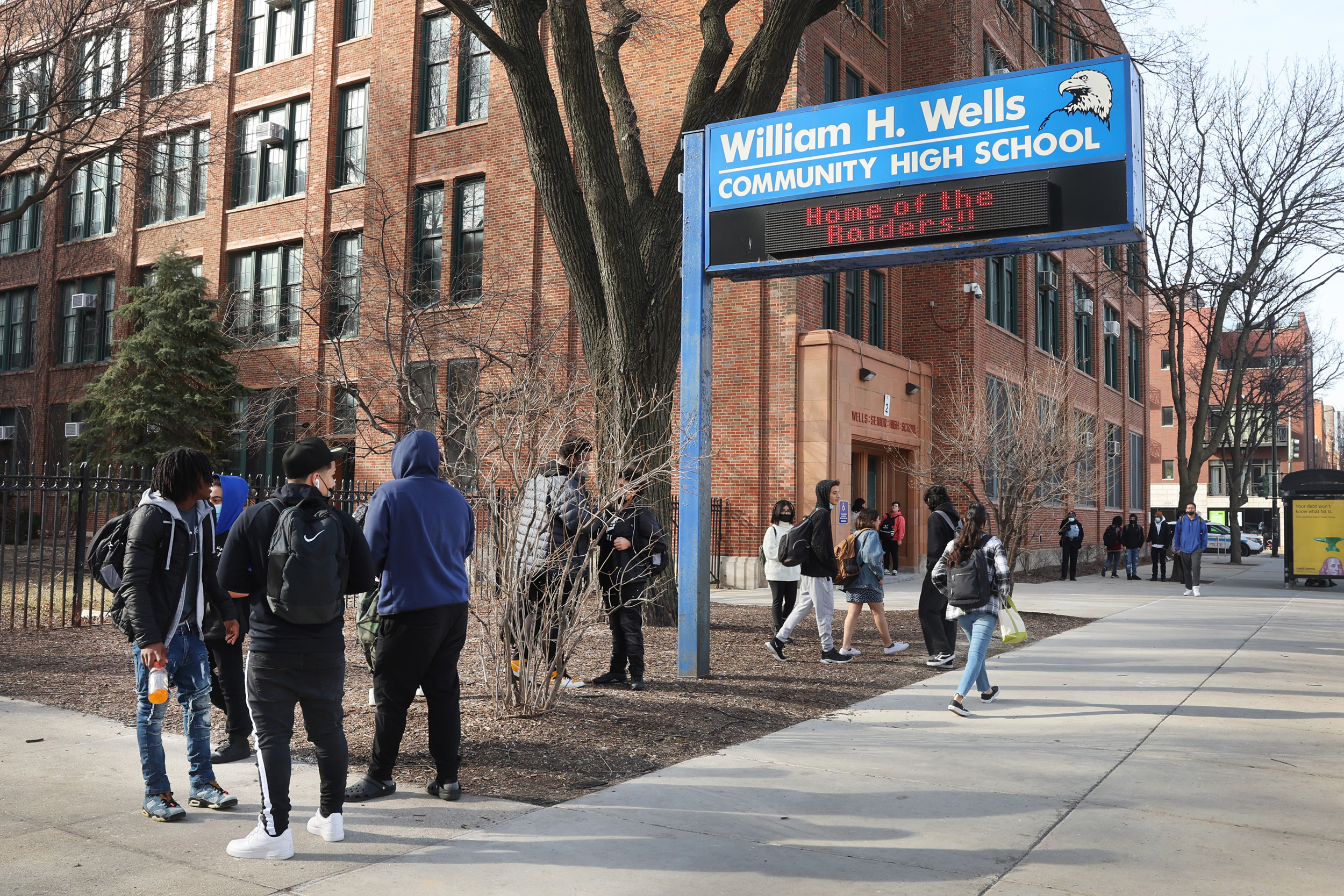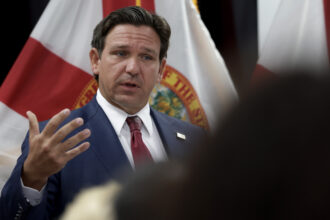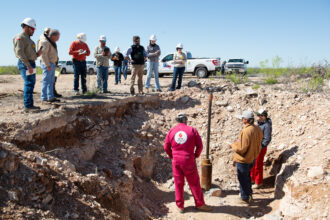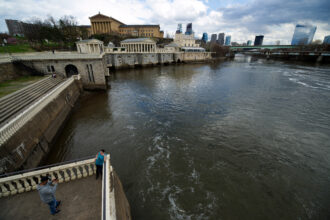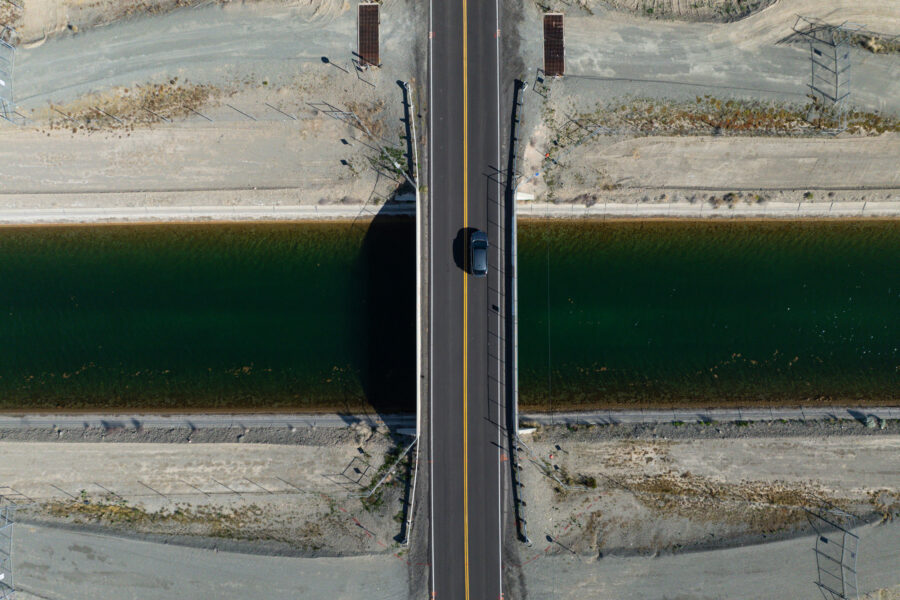Last year, Laura Stamp asked her eighth-grade students a thought-provoking question: If they could redesign their city, how would they make it more sustainable?
Stamp, who teaches science at Brooks Middle School in Oak Park—a suburb of Chicago—wanted her students to take a closer look at how they could mitigate carbon emissions from industries contributing to global climate change: food waste, fast fashion and transportation.
Over the course of three weeks, her students proposed more bike lanes, bus lanes and trolleys, evaluating their recommendations against Oak Park’s existing climate action plan. Stamp’s class also identified how equity and sustainability can work hand in hand. For example, students recommended that Oak Park invest more in housing and healthcare in order to increase safety on public transportation, encouraging its use.
“They could see [that] some of the changes are big and systemic, and some of the changes can be really made at a community level,” she said.
Next school year, teachers in public schools across the state will be required by law to educate students on climate change. Stamp hopes that will lead to more comprehensive, community-based climate instruction in every classroom.
Illinois’ law passed in 2024 after a joint effort led by Chicago-area high school activists and the nonprofit group Climate Education for Illinois, part of a growing national trend to better prepare students for the warming world they will inherit. New Jersey, New York, Connecticut, Maine and California have already required such education by law. And this past summer, Oregon also passed a bill requiring climate education.
Illinois’s mandate comes as the state experiences rising impacts from climate change.
“In Illinois, especially in the recent years, we’ve been seeing a high rate of tornadoes, flash floods and smoke coming in from Canada,” said Abhinav Anne, a senior at Neuqua Valley High School in Naperville who helped advocate for the new law. “Although we aren’t [on] the coastlines in California or Florida, we do see a lot more of the onset of climate change within these larger natural disasters that are happening more in the Midwest region.”
But Illinois hasn’t allocated funding to support the rollout of the climate education mandate. And the federal government, busy rolling back climate protections and censoring references to global warming, won’t be picking up the slack.
Education advocates are coming together to fill in the gaps so teachers have the resources they need to work climate change into their lessons.
They don’t have to start from scratch. The state’s Learning Standards for Science already included climate change, according to the Illinois State Board of Education.
Still, Helen von den Steinen, co-founder of Climate Education for Illinois, noted that climate education requirements had been largely limited to high school science courses. The new law, she said, offers a clearer mandate that climate change should be taught at all grade levels and can be incorporated in all subjects—not just science.
Von den Steinen sees climate change as a lens through which to teach. For example, in math class teachers can use graphs that employ data from renewable energy developments. Even in English class, students can learn about climate change through an analysis of phrases like “canary in the coal mine” and its broader environmental implications.
Over 300 lesson plans, spanning all grade levels and subjects, ranging from visual and performing arts to world languages and social studies, can be found in the Illinois Climate Education Hub. The hub also includes climate change explainers and a professional development calendar to help increase teachers’ confidence with the subject material. The hub’s leaders say that scientists and educators vet all their lesson plans, which are also aligned with state learning standards.
The Illinois Climate Education Hub is powered by SubjectToClimate, a nonprofit organization that provides free climate education resources to teachers. The group creates a hub in a state when it sees enough interest there in climate education. Now it’s operating hubs in nine states. Illinois, the latest addition, launched last month.
This story is funded by readers like you.
Our nonprofit newsroom provides award-winning climate coverage free of charge and advertising. We rely on donations from readers like you to keep going. Please donate now to support our work.
Donate NowKatie Nahrwold, who leads Illinois’ hub, said many of the lessons are specific to the state and can be broken down by region, with some relating to the Great Lakes or farming in rural areas.
According to Lauren Madden, an elementary science education professor at the College of New Jersey, regionally specific learning is essential to creating comprehensive climate education plans.
“While I think we can all think of examples of sad polar bears, that’s not necessarily relevant to the everyday lives of most children,” Madden said. “Seeing the way climate affects our own places and our own communities is really important, too.”
One of the philosophies guiding the Illinois Climate Education Hub is the understanding that some teachers may feel overwhelmed. Many are still struggling to catch up after the COVID-19 pandemic disrupted schools—and are now dealing with the fear and attendance drops that have come with the Trump administration’s decision to send masked immigration agents en masse to the state.
“People believe that education is the answer to everything, and it often is, but that doesn’t necessarily mean we need to add a load onto teachers,” von den Steinen said. “We also understand that teachers don’t have extra time or headspace to teach about climate change as a separate topic. They need it integrated into their day-to-day.”
Madden, who helped with the rollout of New Jersey’s climate education law, adds that one of the best practices for supporting teachers is to ensure that they don’t have to reinvent the wheel.
“[States like New Jersey and Illinois] only have the standards, which are the list of ideas that you teach,” Madden said. “They don’t tell you what learning strategies to use, what curricular materials to use, what particular lessons or activities to do. That’s up to teachers, which means there need to be a lot of options of high-quality materials that teachers have access to.”
“Teachers don’t have extra time or headspace to teach about climate change as a separate topic. They need it integrated into their day-to-day.”
— Helen von den Steinen, Climate Education for Illinois
Climate change education and student advocacy efforts have historically centered in affluent school districts near large urban areas, according to von den Steinen. That’s why robust, free lesson plans are critical for equity.
“The kids that are in either the poorer … areas or different areas of the state are actually the ones that are going to be more impacted by climate change and have less resources to deal with it,” she said.
Online resources can be helpful, but teachers have limited planning time and may not be sure how well it will translate to the classroom, said Jeff Grant, a science teacher at Downers Grove North High School in DuPage County. “You don’t want to waste an entire class period, fall flat in your face and then have to back up again and do something different with kids,” he said.
That’s why he sees teacher training as another crucial equity tool for implementing the new law. Conferences that help teachers brush up on their climate change knowledge are particularly effective, he said. Grant is among those organizing a climate-focused professional development day for teachers next February.
Elizabeth Moore, who teaches fifth-grade math and science in Will County, added that teachers need time more than anything. “It may be something that has to kind of start off small, and [that] we build upon,” she said.
Added Madden: “If we tell teachers, ‘Here’s this new thing you have to do on top of everything else,’ it can be really overwhelming. Taking some time to really be purposeful and look at places where [climate education] makes sense—I think that’s the way we could have the most meaningful and engaging climate learning.”
About This Story
Perhaps you noticed: This story, like all the news we publish, is free to read. That’s because Inside Climate News is a 501c3 nonprofit organization. We do not charge a subscription fee, lock our news behind a paywall, or clutter our website with ads. We make our news on climate and the environment freely available to you and anyone who wants it.
That’s not all. We also share our news for free with scores of other media organizations around the country. Many of them can’t afford to do environmental journalism of their own. We’ve built bureaus from coast to coast to report local stories, collaborate with local newsrooms and co-publish articles so that this vital work is shared as widely as possible.
Two of us launched ICN in 2007. Six years later we earned a Pulitzer Prize for National Reporting, and now we run the oldest and largest dedicated climate newsroom in the nation. We tell the story in all its complexity. We hold polluters accountable. We expose environmental injustice. We debunk misinformation. We scrutinize solutions and inspire action.
Donations from readers like you fund every aspect of what we do. If you don’t already, will you support our ongoing work, our reporting on the biggest crisis facing our planet, and help us reach even more readers in more places?
Please take a moment to make a tax-deductible donation. Every one of them makes a difference.
Thank you,


